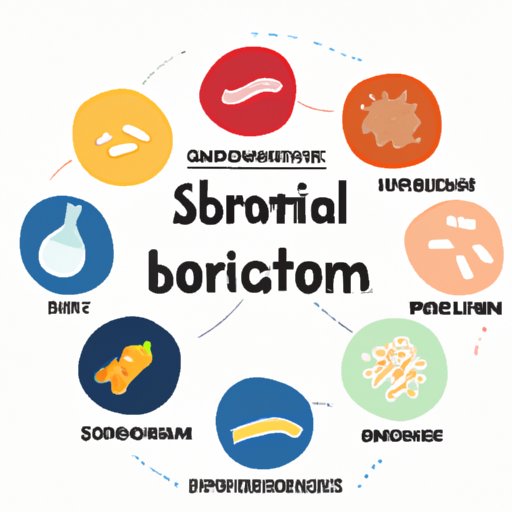I. Introduction
Do you ever feel uncomfortable and swollen after a meal? That’s bloating, and it can be frustrating to deal with. Bloating occurs when your digestive system has difficulty breaking down food, leading to excess gas and discomfort. Thankfully, there are simple strategies you can incorporate into your routine to reduce bloating and promote a healthier gut. In this article, we’ll explore seven effective strategies for combatting bloating.
II. Increase Your Water Intake
Drinking more water is a simple but powerful way to reduce bloating. Water can flush out excess sodium, which contributes to bloating, as well as improve digestion by helping food move through your digestive system. It’s recommended to drink at least eight glasses of water per day, but you may need more depending on your activity level and climate. Try carrying a water bottle with you throughout the day or setting reminders on your phone to help you stay on track. Not only will increasing your water intake help reduce bloating, but it also has other benefits like improving skin health and boosting energy levels.
III. Cut Back on Salt and Processed Foods
Salt is a common ingredient in many processed and packaged foods, and it can contribute to bloating by causing your body to retain water. Some high-sodium foods to avoid include canned soups and vegetables, frozen meals, and processed meats like deli meat or bacon. Instead, opt for fresh, whole foods like fruits, vegetables, and lean protein. When cooking at home, try using herbs and spices to season your food instead of adding salt.
IV. Eat More Fiber
Fiber is excellent for digestion and can help to reduce bloating. Foods high in fiber can also reduce constipation, which can contribute to bloating. Some examples of high-fiber foods include whole grains, fruits, vegetables, and legumes. However, it’s essential to increase fiber intake gradually because a sudden increase can cause gas and bloating. Aim to add one high-fiber food to each meal or snack, and slowly increase your intake over time.
V. Try Probiotics
Probiotics are beneficial bacteria that live in your digestive tract and can help promote healthy digestion and reduce bloating. Some examples of probiotic-rich foods include yogurt, kefir, and kimchi. There are also probiotic supplements available, but it’s important not to over-rely on them. It’s best to get probiotics from a variety of sources and to talk with your doctor before starting any new supplements.
VI. Avoid Chewing Gum
Chewing gum can cause you to swallow excess air, leading to bloating and discomfort. Try cutting back on gum or finding alternatives like sucking on mints or drinking water. It’s also crucial to be mindful of other potential causes of swallowed air, such as drinking carbonated beverages or eating too quickly.
VII. Exercise Regularly
Regular exercise can benefit your digestive health and help reduce bloating. Exercise can help food move through your digestive system more effectively and can promote regular bowel movements. Even short, simple exercises like going for a walk or doing some gentle yoga poses can be helpful. However, it’s essential to listen to your body and not push yourself beyond your limits. Over-exertion can actually contribute to bloating and discomfort.
VIII. Reduce Stress
Stress can have a significant impact on your digestive system and can lead to bloating. When you’re stressed, your body produces stress hormones that can slow down digestion and cause discomfort. Finding ways to manage stress, such as practicing meditation, deep breathing, or massage therapy, can be helpful in reducing bloating and promoting overall health. If you’re struggling with persistent stress, it’s essential to seek professional support from a therapist or healthcare provider.
IX. Conclusion
In conclusion, bloating can be uncomfortable, but there are many simple strategies you can incorporate into your routine to reduce it. It’s important to listen to your body and explore what works best for your individual needs. By increasing your water intake, reducing your sodium intake, eating more fiber, trying probiotics, avoiding chewing gum, exercising regularly, and reducing stress, you can promote a healthier gut and reduce bloating for good. Remember to be patient and kind with yourself as you incorporate these changes, and don’t hesitate to seek support if you need it.
